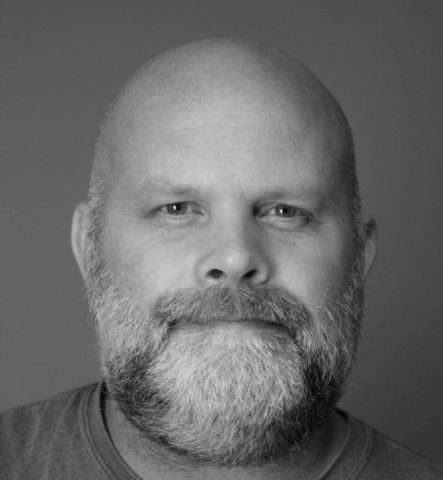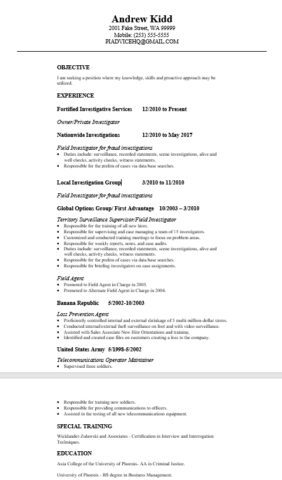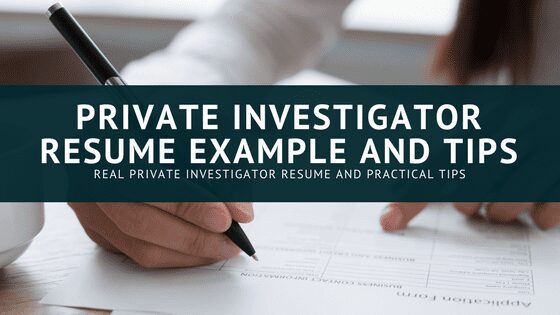Podcast: Play in new window | Download
Because I want you to be successful and have an opportunity to become a private investigator I felt that sharing my private investigator resume example (with some minor changes) would help you in crafting or even formatting your resume when applying for private investigation positions.
Now I don’t claim to be a resume writing master by any means, but when I send my resume out I don’t have any problems getting calls from potential companies. So you will see not only how my resume is formatted but you will see how I present my experience to prospective employers in the investigation field.
Before getting to the actual resume I want to share some friendly tips that I think will help you be successful when modifying or creating your resume.
Contents
- 1 10 Private Investigator Resume Tips
- 2 #1. Don’t Lie on or Embellish on Your Resume
- 3 #2. Tailor Your Resume for the Job
- 4 #3. Sometimes They Don’t Need Your Entire Employment History
- 5 #4. No Pictures on Your Private Investigator Resume
- 6 #5. Format Your Resume in Chronological Order
- 7 #6. No Objective in Your Resume
- 8 #7. Don’t Mention What High School You Attended
- 9 #8. Don’t Provide Previous Salaries in Your Resume
- 10 #9. One Page Resume (at the most two)
- 11 #10. Consider a Cover Letter
- 12 Private Investigator Resume Example
10 Private Investigator Resume Tips
#1. Don’t Lie on or Embellish on Your Resume
I would strongly recommend not lying about your experience, previous employers, or anything for that matter on your resume. I can’t tell you how many times someone has been caught lying on a resume to get hired as a private investigator. We are truth finders and we don’t want to hire liars.
Don’t act like you know more than you really know. Don’t say you have done more than you have really done. Your integrity and character mean a great deal in this industry. If you get hired by a company you will eventually be found out.
Far too many people try to sell themselves as knowing or doing more than they have done. Investigators that know the job can sniff this out very quickly just by asking you questions. And if they peg you as someone that isn’t truthful, then you will not be trusted by supervisors or coworkers.
#2. Tailor Your Resume for the Job
Now I don’t want you lying or embellishing; we just covered that. But if you don’t have any or very little experience it would be good to make sure that previous experience (in whatever job you had) can cross over in even the smallest ways to the job you are applying for. Think about what they are looking for and look for opportunities in your resume to connect to that.
If you wrote reports as a security officer then I would make sure you mention how you wrote reports. If you did any investigative work or research with your job I would mention that as well.
#3. Sometimes They Don’t Need Your Entire Employment History
Every company is different in regards to what they are looking for. Some companies want to know every job you have ever had while some may only want your job history for the last 10 years.
Every applicant is different. Some will try to enter investigation industry after working 30 years at one job which may be unrelated to investigations, while others will have numerous jobs in a 10-year span.
I know some companies don’t want to see that you delivered pizzas for a year and are more focused on what jobs you have had that are related to the field you are applying for.
If possible keep short-term unrelated jobs off the resume. You can always use the statement, “More employment history available upon request.”

#4. No Pictures on Your Private Investigator Resume
Never have I reviewed an investigator’s resume with an enclosed picture. Many articles on resumes say unless you are trying to be a model or an actor there is no reason to add your picture to a resume.
#5. Format Your Resume in Chronological Order
Companies like to see progress and advancement as if a person is growing in their occupation. A resume reveals a lot of things about a candidate. I have mentioned this in a podcast in the past about building on your experience.
A functional chronological list of employers can show how you have evolved as an employee or how you are working towards an investigation career (should you be new to the industry).
#6. No Objective in Your Resume
This has gone out of style over the last 6 or so years. It was in style when I first entered the industry.
An objective has become unnecessary in resumes as it is said to hurt a resume more than help it. Many resume professionals state an objective focuses on more of what you want rather than what you can offer the company.
#7. Don’t Mention What High School You Attended
Unless recently graduated from high school, there is no reason to bring it up as it adds no value. And also if for some reason you do add where you graduated from high school don’t provide the graduation date as that will date you. There is no reason to allude to your age as it should not be a factor in the back of someone’s mind when they are looking through resumes.
#8. Don’t Provide Previous Salaries in Your Resume
It would be very difficult to negotiate a better salary if your future employer knows what you were previously being paid. Do not provide salary information on your resume.
#9. One Page Resume (at the most two)
If you are a younger applicant (like in your 20’s) then you likely don’t have a great deal of work experience. You should keep your resume to one page.
Older investigation candidates with a longer work history should do their best to condense their resume to one page unless they have no choice but to make it two pages. Remember you can still add things to your cover letter to explain your experience.
#10. Consider a Cover Letter
A cover letter is a great way to connect the dots for an employer in regards to showing them how your previous work experience or education can relate or be an asset to their company. You will need to review the job posting and see what experience they are looking for and show them how your previous jobs, education, and training make you a good fit for their company.
With that being said, a cover letter shouldn’t be a 4-page essay. Keep it to one page.
Create a 3 paragraph cover letter with the following:
- An introduction to who you are, what job you are applying for and how you learned about the job.
- Discuss how your skills make you a good fit for their company and match your skills with the job description.
- Conclusion- Thank them for their consideration.
Private Investigator Resume Example
Below is a private investigator resume example. This one is actually just over one page and could be trimmed down a bit as it covers 20 years of work experience.
Everything is in chronological order and you can see the progression in this resume and it also tells a story of the candidate.
Andrew Kidd
2001 Fake Street, WA 99999
Mobile: (253) 555-5555
PIADVICEHQ@GMAIL.COM
__________________________________________________________________________
EXPERIENCE
Fortified Investigative Services 12/2010 to Present
Owner/Private Investigator
Nationwide Investigations 12/2010 to 5/2017
Field Investigator for fraud investigations
- Duties include: surveillance, recorded statements, scene investigations, alive and
well checks, activity checks, witness statements.
- Responsible for the prelim of cases via database searches.
Local Investigation Group 3/2010 to 11/2010
Field Investigator for fraud investigations
Global Options Group/ First Advantage 10/2003 – 3/2010
Territory Surveillance Supervisor/Field Investigator
-
- Responsible for the training of all new hires.
- Responsible for supervising and case managing a team of 15 investigators.
- Customized and conducted training meetings to focus on problem areas.
- Responsible for weekly reports, notes, and case audits.
- Duties include: surveillance, recorded statements, scene investigations, alive and
well checks, activity checks, witness statements.
-
- Responsible for the prelim of cases via database searches.
- Responsible for briefing investigators on case assignments.
Field Agent
-
- Promoted to Field Agent in Charge in 2005.
- Promoted to Alternate Field Agent in Charge in 2004.
Banana Republic 5/2002-10/2003
Loss Prevention Agent
-
- Proficiently controlled internal and external shrinkage of 5 multi-million-dollar stores.
- Conducted internal/external theft surveillance on foot and with video surveillance.
- Assisted with Sales Associate New Hire Orientations and training.
- Identified and created case files on customers creating a loss to the company.
United States Army 5/1998-5/2002
Telecommunications Operator-Maintainer
-
- Supervised three soldiers.
- Responsible for training new soldiers.
- Responsible for providing communications to officers.
- Assisted in the testing of all new telecommunications equipment.
SPECIAL TRAINING
Wicklander-Zulawski and Associates – Certification in Interview and Interrogation Techniques.
EDUCATION
Axia College of the University of Phoenix- AA in Criminal Justice.
University of Phoenix – BS degree in Business Management.

Recent Posts
Hawaii is probably one of the most interesting states to work as a private investigator if you are not used to the culture or a native of the state. And if you are not a local, that is something...
How to become a private investigator in Georgia

